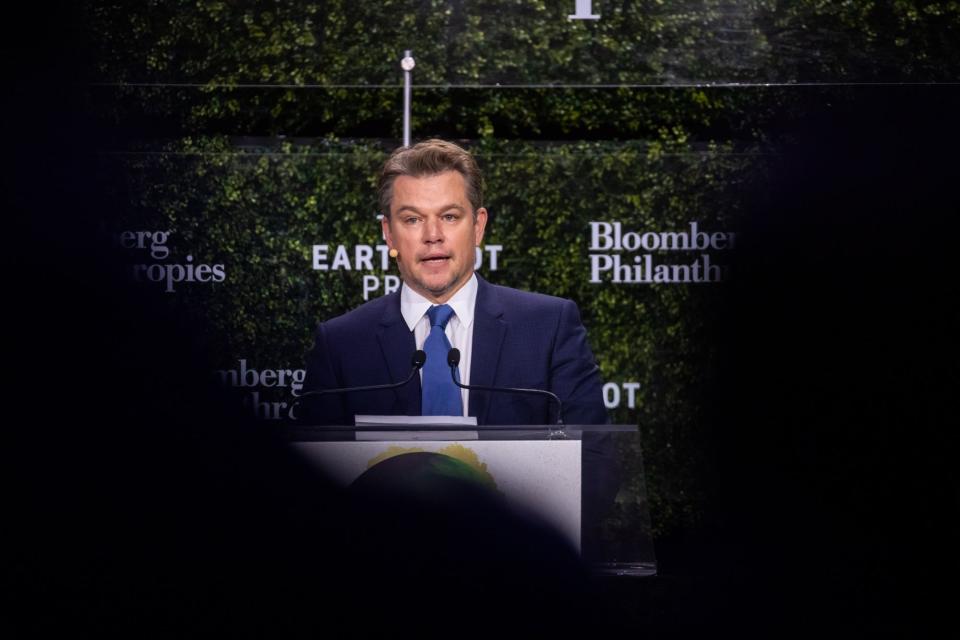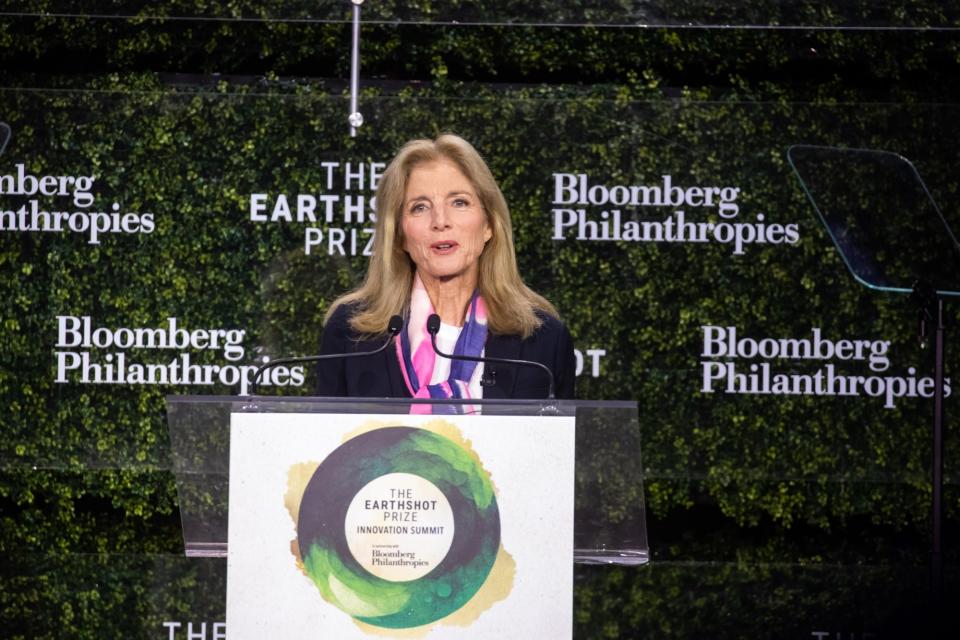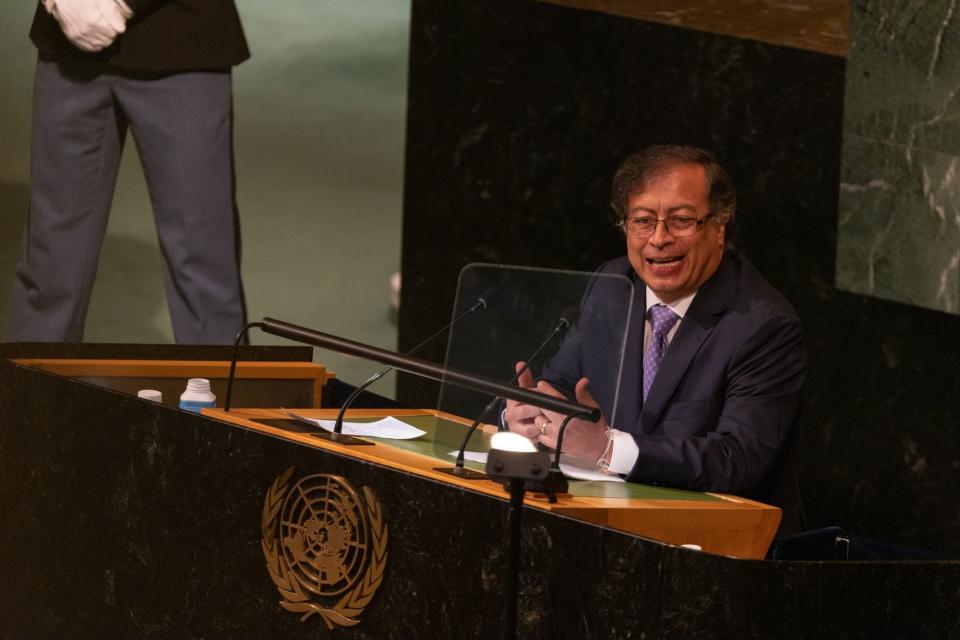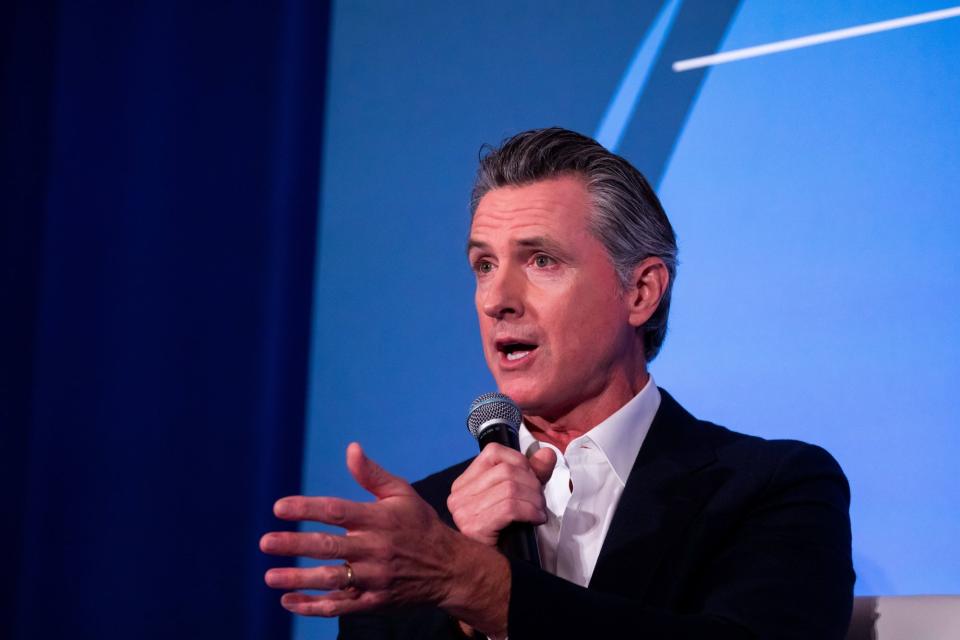Gates Touts Green Hydrogen for Industries: Earthshot Update
- Oops!Something went wrong.Please try again later.
- Oops!Something went wrong.Please try again later.
- Oops!Something went wrong.Please try again later.
(Bloomberg) -- Climate change is the focus of dozens of events in New York City this week, as world leaders, corporate executives, activists and artists all converge for both the United Nations General Assembly and Climate Week.
That includes the Race to Zero and Resilience Forum Wednesday, organized by the UN Climate Action High-level Champions and Michael Bloomberg, majority owner of Bloomberg LP, the parent of Bloomberg News. The event has connected government leaders and environmental activists, with the goal of delivering capital globally to groups working to reduce emissions without exacerbating debt in vulnerable communities. Speakers including California Governor Gavin Newsom and renowned naturalist Jane Goodall are discussing significant achievements that have been made and also key next steps that are required.
More information about the event can be found online and on the Bloomberg Terminal.
Colombian President Questions Whether Market Can Stop Crisis (3:20 p.m.)
Gustavo Petro, who took office as Colombia’s first leftist president this year, questioned whether markets have the ability to arrest climate change, chiding leaders for following capitalism as a solution.
“We have to wonder whether capitalism can overcome this climate crisis or lead to the destruction of society,” Petro said. “If you want to solve the climate crisis, that means a total change of technology of consumption. That means we have to look at it from another lens, which isn’t the market.”
In a 25-minute speech that meandered into political theory, lessons from the Covid-19 pandemic and the impact of a fossil fuel-based economy, Petro urged world leaders to act to save the planet from the point of no return. “We play ostrich with our heads in the sand and go from COP to COP to COP until time runs out,” he said.
The former mayor and senator took office as president in August, pledging a transition to sustainable energy for the oil and coal exporter.
California’s Newsom Slams Texas Energy Policies (3:45 p.m.)
California Governor Gavin Newsom talked up his state’s investment in green technologies while criticizing Republican politicians for not taking similar stances.
An extreme heat wave earlier this month pushed California’s power grid to the brink of failure, but Newsom said the state was able to avoid widespread power outages because it has invested heavily in big batteries. In contrast, he said, Texas has clung to fossil-fuel generation after a winter storm last year left much the state in the dark for days.
“Look what happened in Texas last year. They doubled down on stupid,” he said at the forum. “Why the hell are they doubling down on the policies that created those conditions?”
Newsom praised climate efforts from President Joe Biden, but was also critical of the White House. Notably, he compared the size of California’s electric infrastructure package with national investments.
As the talk was concluding, Newsom was asked whether he would run for president. “No, I want to do something for a living,” he said. “I like being governor of California. I can get stuff done.”
Standards Needed to ‘Match Ambition With Action’ (3:12 p.m.)
Stronger standards are vital to ensuring emission-cutting pledges and programs translate into real action on the ground, former Canadian environmental minister Catherine McKenna said at the event, telegraphing an upcoming UN report on the issue.
The UN secretary-general’s High-Level Expert Group on Net-Zero Commitments, which McKenna chairs, is set to release its analysis before the COP27 climate summit in November in Egypt.
The effort comes amid a wave of national and corporate net-zero commitments. And it’s driven by concern regarding greenwashing and the need to “match ambition with action,” McKenna said.
“There’s a limit to voluntary initiatives,” she said. Many communities and corporations simply aren’t part of those voluntary programs — and even those that are may not face consequences for failing to hit their targets.
“You need some consequences,” McKenna said, and the issue will be “a big part of the report.”
Carney Says Some Race-To-Zero Bank Guidance Went Too Far (3 p.m.)
Mark Carney, co-chair of the Glasgow Financial Alliance for Net Zero, said some of the climate group’s guidance for banks went too far and has been amended.
Carney, who is also vice chair of Brookfield Asset Management, was responding to reports that financial giants including JPMorgan Chase & Co. and Morgan Stanley are considering leaving GFANZ because they’re concerned the organization’s strict requirements for decarbonization may make them legally vulnerable. Carney didn’t mention any financial companies in his presentation at the event.
Also See: Banks May Leave Mark Carney’s Climate Group on Legal Risks
Race to Zero, the body behind the criteria that underpins GFANZ, issued a clarification Friday, updating its guidance around fossil fuels and new coal projects. It said it was aware “there may be cause for legal concern” around these areas while reaffirming its members have always been required to phase out coal and align to the goal of limiting warming to 1.5 degrees Celsius.
Wealthy Nations Must Address Trust ‘Deficiency,’ Shoukry Says (2:30 p.m.)
Rich nations must work to overcome lingering distrust over their failure to fulfill climate finance pledges, according to Sameh Shoukry, president-designate of COP27, underscoring a source of tension that threatens to undermine upcoming negotiations in Egypt.
“There is a deficiency in trust, and we must regain that confidence,” Shoukry, Egypt’s foreign affairs minister, said at the forum.
Wealthy nations have yet to satisfy their promise of providing $100 billion in annual funding to help poor countries address climate change — a shortfall that still needs to be filled. A plan for after 2025 also is still being developed.
Although the upcoming COP27 climate summit is meant to focus on implementation, Shoukry’s comments emphasize the extent to which other concerns may intrude. Climate-vulnerable countries are pushing for the establishment of a loss and damage program that can help nations deal with devastating floods, droughts and other consequences of the warming planet.
On loss and damage, “it’s still a question whether it’s going to be sufficiently addressed,” Shoukry said.
Countries Must Boost Climate Ambitions, Stiell Says (1:55 p.m.)
Simon Stiell, executive secretary of the UN Framework Convention on Climate Change, stressed the importance of corporate action to buttress national emissions-cutting commitments, even as he urged nations to boost their ambitions.
“Paris, Glasgow and a host of other conferences proved that climate change has slowly moved to the center of the international agenda, but it’s time to move it to the center of each national agenda,” Stiell said at the event.
His comments come about six weeks before the next UN climate summit in Egypt, and days before countries are due to submit any new or revised emissions-cutting pledges under the Paris Agreement.
Initiatives around transparency and accountability are also critical, he said. “The commitments made must be commitments delivered.”
Nordic Real Estate Partners Pushes to Make Cities More Walkable (1:20 p.m.)
Nordic Real Estate Partners A/S is partnering with a group of about 100 mayors around the world to promote making cities less dependent on cars as part of the fight against climate change.
The collaboration announced Wednesday between the Copenhagen-based firm and the group, C40 Cities, will promote the so-called “15-minute cities” concept -- the idea that cities should be designed to have everything residents need within a 15-minute walk, bike ride or public transit ride. The effort will begin with pilot programs in several cities, which have not yet been announced.
Claus Mathisen, NREP’s chief executive officer, did not disclose how much money the firm is committing to the initiative but said it made a “significant financial contribution.” Nordic Real Estate Partners has 18 billion euros ($17.8 billion)in assets under management, he said.
“Dense, multi-purpose neighborhoods see a reduction in emissions,” Mark Watts, the executive director of C40, said during a press conference. The concept helps to reduce carbon emissions and “reclaims space in cities from polluting vehicles back to people,” he added.
Bloomberg Targets Growth of Petrochemical Plants (12:30 NY time)
Bloomberg Philanthropies announced an $85 million program to slow the expansion of the petrochemical industry, building on past initiatives that pushed to close coal plants and reduce greenhouse gas emissions.
The effort announced Wednesday will target 120 new or proposed oil, gas and petrochemical plants across at least five states, from the US Gulf Coast to the growing gas hub of the Ohio River Valley.
“The world is transitioning to renewable energy,” but oil and gas companies are turning to plastics and petrochemicals as a lifeline, Abigail Dillen, president of Earthjustice, said. “We can’t afford a new investment in fossil fuels.”
Funding could help arm front-line communities already battling plastics and chemical plants, including in Louisiana’s infamous “Cancer Alley.” Those activists are like David fighting Goliath, Rev. Lennox Yearwood Jr., chair of the Beyond Petrochemicals Campaign, said. “It’s time to give David some new stones for his slingshot.”
Cheap Hydrogen Offers ‘Magic’ Path to Clean Industrial Processes: Gates (12:10 p.m. NY time)
Hydrogen has the potential to significantly reduce emissions from industrial processes, if it can be produced at a low-enough cost, according to billionaire Bill Gates.
Industrial processes for products like steel and cement are significant sources of emissions. While there are new ways to produce them, high costs remains a barrier. Technologies to produce hydrogen can help address these challenges, Gates said during the event.
“If you get the hydrogen cheap enough, you get the super-magic thing, which is that the green product doesn’t cost more,” Gates said.
Innovation Key to Climate Fight, New Zealand’s Ardern Says
Fostering new technologies and new environmental policies will be a key element of the global fight against climate change, New Zealand Prime Minister Jacinda Ardern said at the Earthshot Prize Innovation Summit.
Her comments reflect the growing awareness that limiting global warming is a monumental challenge that will require significant backing from governments and businesses.
While New Zealand has historically contributed a small portion of the air pollution that’s driving climate change, Ardern has won praise for her aggressive stance on curbing emissions, making her a leading voice in the environmental debate.
“We cannot expect environmental innovation to happen in a vacuum,” Ardern said. “As governments, we have a responsibility to create the incentives and the space for you to flourish.”
More stories like this are available on bloomberg.com
©2022 Bloomberg L.P.








